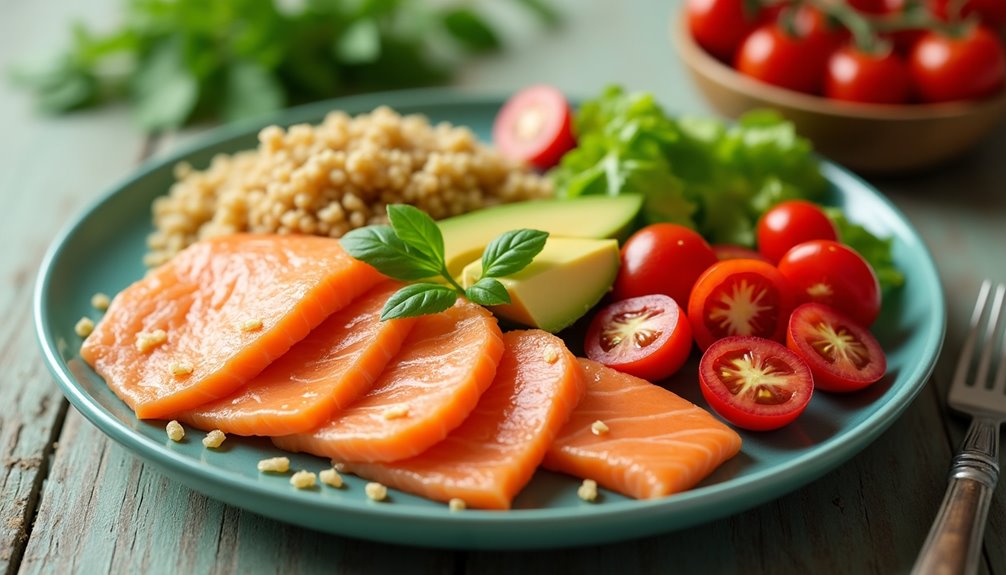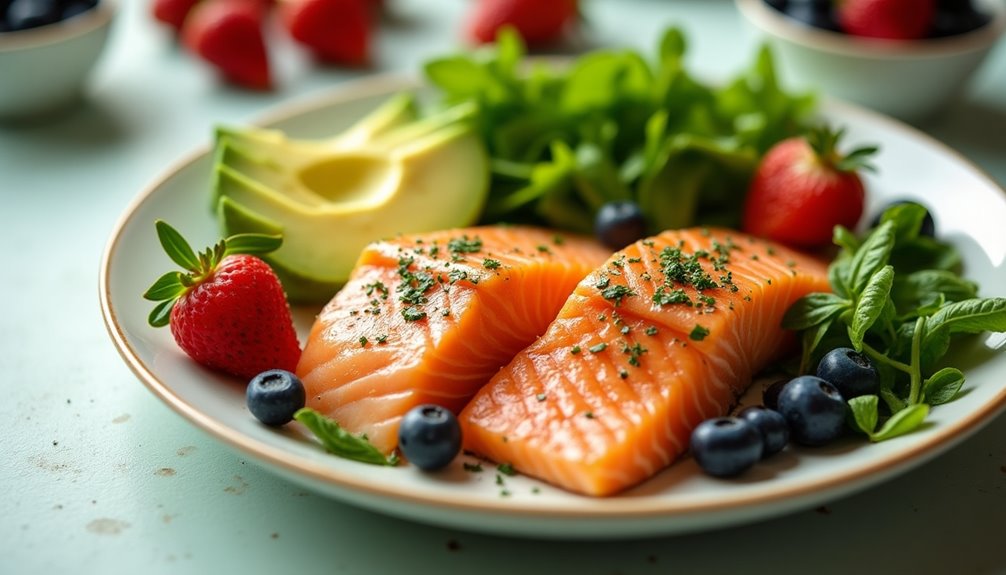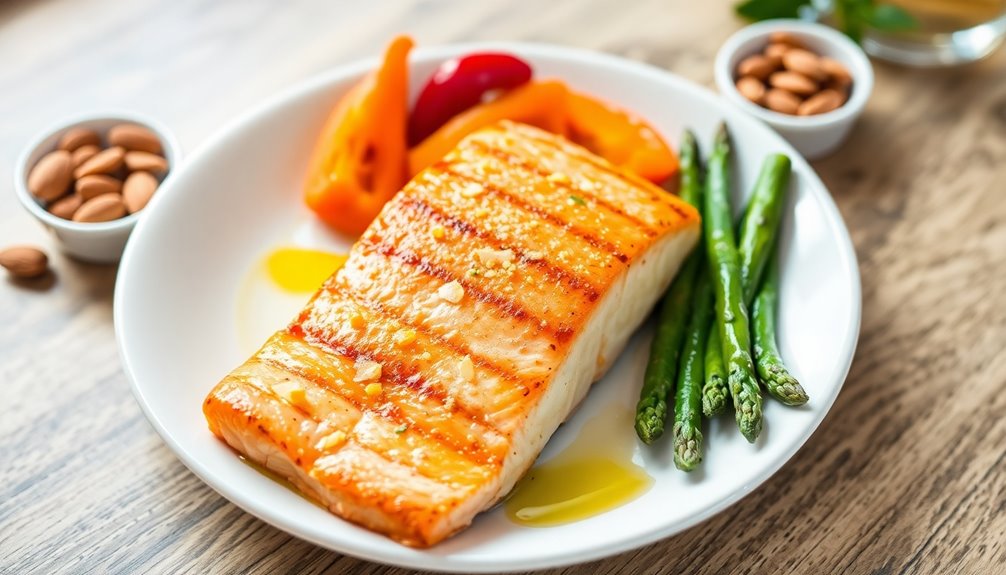The Zone Diet focuses on balancing your macronutrients with a ratio of 40% carbohydrates, 30% protein, and 30% fat. This balance aims to regulate insulin levels, helping you manage weight and enhance overall health. You'll prioritize low-glycemic carbs, lean proteins, and healthy fats while avoiding processed foods and sugary snacks. Meal planning is essential, allowing you to control portions and stay within your macronutrient goals. Benefits include weight loss, improved energy levels, and better cognitive function. If you want to explore meal ideas and tips for success, there's plenty more to uncover.
Key Takeaways
- The Zone Diet focuses on a balanced macronutrient ratio of 40% carbohydrates, 30% protein, and 30% fat for optimal health.
- It emphasizes low-glycemic carbohydrates, lean proteins, and healthy fats to regulate insulin levels and manage energy.
- Meal planning and portion control are crucial to prevent overeating and maintain calorie intake within the recommended macronutrient goals.
- Foods to include are fresh vegetables, healthy fats like avocados, and high-quality protein sources for improved energy and mood.
- Common challenges include meal prep and social events; joining a supportive community can enhance long-term adherence to the diet.
What Is the Zone Diet?

The Zone Diet is a dietary plan designed to balance macronutrients and promote peak health. It emphasizes the importance of consuming a specific ratio of carbohydrates, proteins, and fats to maintain ideal body function. By following this approach, you can effectively manage your weight while enhancing your athletic performance. This balance helps regulate insulin levels, which is vital for both energy production and fat loss.
When you adhere to the Zone Diet, you focus on eating low-glycemic carbohydrates, lean proteins, and healthy fats. This combination not only stabilizes your blood sugar but also keeps you feeling full and satisfied. Research supports that such macronutrient balance can lead to improved metabolic rates and better weight management outcomes.
For athletes or active individuals, the benefits extend beyond just weight control. Consuming the right mix of nutrients can enhance recovery, increase endurance, and improve overall performance. When your body receives the proper fuel, you'll likely notice a boost in energy levels and stamina during workouts.
Ultimately, the Zone Diet is more than just a meal plan; it's a lifestyle choice. By embracing this method, you join a community focused on health, efficiency, and well-being. You'll likely find camaraderie and support among others who share your goals of weight management and athletic performance. Additionally, studies indicate that a balanced diet can significantly contribute to managing conditions like Type 2 diabetes. So, if you're looking for a practical, science-backed way to achieve your health aspirations, the Zone Diet might just be the right fit for you.
Key Principles of the Zone Diet

Understanding the key principles of the Zone Diet is vital for successfully implementing this nutritional strategy. At its core, the Zone Diet emphasizes the importance of portion control and balanced meals. By focusing on these principles, you can create an eating plan that helps you maintain a healthy weight while enhancing your overall well-being.
Portion control is pivotal in the Zone Diet. You'll want to gauge your food intake by measuring your portions carefully. This helps prevent overeating and guarantees that you're consuming the right amounts of macronutrients. Remember, it's not just about what you eat; it's about how much you eat. By being mindful of your portions, you can better manage your calorie intake and feel satisfied without going overboard.
Balanced meals are another cornerstone of the Zone Diet. Each meal should consist of a specific ratio of carbohydrates, proteins, and fats. While the macronutrient ratios will be discussed later, the focus here is on the idea that a well-rounded meal keeps your blood sugar stable and your energy levels consistent.
Aim to include a variety of foods in your meals, such as lean proteins, healthy fats, and fiber-rich carbohydrates. This diversity not only enhances nutrient intake but also keeps your meals enjoyable and satisfying. Additionally, adopting a plant-based diet can further improve your overall health and well-being.
Macronutrient Ratios Explained

In the Zone Diet's framework, mastering macronutrient ratios is necessary for achieving peak health and weight management. This diet emphasizes a specific balance: 40% carbohydrates, 30% protein, and 30% fat. By adhering to these ratios, you can optimize your body's insulin control, an essential factor in maintaining energy levels and preventing fat storage.
When selecting your protein sources, aim for high-quality options. Lean meats, fish, eggs, and plant-based proteins like legumes and tofu are excellent choices. These protein sources not only help in muscle repair but also keep you feeling satiated, reducing the temptation to overeat. Remember, the quality of your protein matters just as much as the quantity.
Carbohydrates should come primarily from low-glycemic sources, such as vegetables and whole grains. These options release glucose slowly into your bloodstream, aiding in stable insulin levels. Avoiding high-glycemic carbs can help you manage hunger and maintain consistent energy throughout the day.
Fats are also essential in the Zone Diet. Focus on healthy fats from sources like avocados, nuts, and olive oil. These fats not only support hormone production but also contribute to better nutrient absorption. Additionally, incorporating tools for progress tracking such as meal logging can enhance your adherence to the Zone Diet, ensuring you stay within your macronutrient goals.
Benefits of the Zone Diet

Following the macronutrient ratios in the Zone Diet can lead to several significant benefits for your overall health and well-being. By balancing carbohydrates, proteins, and fats, you can experience improvements in both weight loss and energy levels. This diet isn't just about losing pounds; it's about creating a sustainable lifestyle that supports your daily activities and long-term health.
Here's a quick overview of the key benefits you can expect:
| Benefit | Description |
|---|---|
| Weight Loss | The balanced approach helps control hunger and cravings, making it easier to maintain a healthy weight. |
| Improved Energy | By stabilizing blood sugar levels, you'll experience more consistent energy throughout the day. |
| Enhanced Mood | Proper nutrition can lead to better emotional health, reducing feelings of anxiety and depression. |
| Better Focus | The right balance of macronutrients supports cognitive function, helping you stay sharp and attentive. |
| Reduced Inflammation | A well-structured diet can lower inflammation, which is linked to various chronic diseases. |
When you commit to the Zone Diet, you're not just choosing a meal plan; you're joining a community focused on health and vitality. As you embrace these benefits, you'll likely find yourself feeling more connected to a supportive network of like-minded individuals striving for the same goals. In turn, this camaraderie can make your journey even more rewarding. Additionally, adopting a balanced diet can help you avoid the complications of weight loss that often arise from restrictive eating habits.
Foods to Include

To successfully adhere to the Zone Diet, you'll want to focus on incorporating a variety of nutrient-rich foods that align with its macronutrient ratios. This approach emphasizes a balance of carbohydrates, proteins, and fats, aiming for a 40:30:30 ratio. Start by filling your well-rounded plates with plenty of fresh vegetables, which should make up a significant portion of your meals. Leafy greens, peppers, and broccoli are excellent choices, providing essential vitamins and minerals.
Next, include high-quality proteins. Lean meats, fish, eggs, and plant-based proteins like legumes and tofu are great options. These foods not only support muscle health but also help keep you satisfied, making it easier to stick to the diet.
Healthy fats are equally important. Incorporate sources like avocados, nuts, seeds, and olive oil. These fats can enhance flavor and help you feel satisfied, which is crucial in maintaining your energy levels throughout the day. Additionally, exploring variety in Keto breakfasts can inspire new meal ideas that are both satisfying and aligned with your dietary goals.
Meal prep plays a crucial role in staying on track with the Zone Diet. By preparing meals in advance, you can make sure that your well-rounded plates are ready to go, reducing the temptation to reach for less nutritious options when hunger strikes.
Foods to Avoid

When starting on the Zone Diet, it's important to avoid certain foods that can disrupt your balance of macronutrients. This diet emphasizes the right mix of proteins, carbohydrates, and fats, so steering clear of specific items is essential for success.
First and foremost, watch your sugar intake. High levels of sugar can lead to inflammation and disrupt the hormonal balance essential for maintaining the Zone. This means you should limit sugary snacks, sodas, and desserts. Instead, focus on whole foods that provide steady energy without the blood sugar spikes.
Next, processed foods are another category to avoid. These often contain unhealthy fats, preservatives, and hidden sugars that can throw your diet off balance. Items like packaged snacks, fast food, and ready-to-eat meals usually lack the nutrients you need. They might make life convenient, but they can hinder your progress on the Zone Diet.
Additionally, pay attention to refined carbohydrates. Foods like white bread, pastries, and many breakfast cereals can quickly increase your blood sugar levels, leading to cravings and overeating. Opt for whole grains when you can, as they provide fiber and nutrients that keep you satisfied. Furthermore, the high glycemic index of refined carbohydrates can trigger repetitive cravings, making it even harder to stick to your dietary goals.
Meal Planning Tips

Effective meal planning is crucial for success on the Zone Diet, as it helps you maintain the right balance of macronutrients throughout the day. By organizing your meals ahead of time, you can guarantee you're hitting the ideal ratio of carbohydrates, proteins, and fats. Here are some practical tips to get you started:
- Grocery Shopping: Make a list before heading to the store. This not only saves time but also helps you stick to your dietary goals. Focus on fresh vegetables, lean proteins, and healthy fats.
- Portion Control: Use measuring cups or a food scale to accurately portion your meals. This practice prevents overeating and keeps you aligned with the Zone Diet principles.
- Meal Prep: Dedicate a couple of hours each week to prepare meals in advance. This step reduces the temptation to stray from your plan when you're busy or tired. A plant-based diet can also provide significant health benefits, making it a great complement to your meal planning.
Here's a simple meal planning table to guide you:
| Meal | Protein Source | Healthy Fat |
|---|---|---|
| Breakfast | Scrambled eggs | Avocado |
| Lunch | Grilled chicken | Olive oil dressing |
| Snack | Greek yogurt | Almonds |
| Dinner | Salmon | Quinoa
Zone Diet Recipes

Diving into the world of Zone Diet recipes can transform your meals into balanced, flavorful experiences that align with your nutritional goals. By focusing on the right proportions of carbohydrates, proteins, and fats, you can enjoy a variety of dishes that keep you satisfied and energized. Here are some easy recipes to get you started:
- Grilled Chicken Salad: Combine grilled chicken breast, mixed greens, cherry tomatoes, and a sprinkle of feta cheese, drizzled with olive oil and vinegar.
- Quinoa Veggie Bowl: Toss cooked quinoa with black beans, diced bell peppers, corn, and avocado for a fulfilling, nutrient-dense meal.
- Zucchini Noodles with Pesto: Use a spiralizer to make zucchini noodles, top them with homemade basil pesto, and add grilled shrimp for protein.
- Greek Yogurt Parfait: Layer Greek yogurt with berries and a handful of nuts for a quick snack that keeps you within the Zone.
- Egg and Spinach Omelette: Whip up an omelette using eggs, fresh spinach, and a side of sliced avocado for a balanced breakfast.
These recipes not only provide balanced meals but also offer quick snacks that fit seamlessly into your daily routine. Additionally, incorporating plant-based protein into your meals can enhance your nutritional intake and keep you feeling full longer. By integrating these dishes into your life, you'll cultivate a sense of community and belonging within the Zone Diet framework. Embrace the flavors, enjoy the process, and feel empowered as you nourish your body!
Common Challenges and Solutions

Facing challenges with the Zone Diet can be a common experience, especially for those new to its principles. One of the most significant hurdles you might encounter is meal prep. With the Zone Diet emphasizing balanced portions of proteins, carbs, and fats, planning your meals can feel overwhelming at first. To tackle this, dedicate a few hours each week to prepare your meals.
Create a simple meal plan, shop for the necessary ingredients, and cook in bulk. This way, you'll have healthy options ready to go, reducing the temptation to stray from the diet when hunger strikes.
Another challenge arises during social events. It's easy to feel isolated when everyone around you indulges in high-carb snacks and sugary treats. To address this, communicate your dietary choices with friends and family. Bring your own Zone-friendly dish to share, ensuring you have a satisfying option.
Additionally, focus on the social aspect of gatherings rather than the food. Engage in conversations, play games, or participate in activities that draw your attention away from the buffet table. Incorporating mini band workouts can also help maintain your fitness goals during this diet transition.
Long-Term Sustainability of the Zone Diet

Maintaining the Zone Diet over the long term can be both rewarding and challenging. While you may experience initial weight loss and improved athletic performance, sticking to the diet requires commitment and mindfulness. Here are some strategies to help you stay on track:
- Plan Your Meals: Take time to prepare meals ahead of time. This helps you avoid last-minute unhealthy choices.
- Stay Informed: Keep educating yourself about the Zone Diet principles. Understanding the science behind it can keep you motivated.
- Join a Community: Connect with others who are also following the Zone Diet. Sharing experiences and recipes can foster a sense of belonging.
- Be Flexible: Allow for occasional treats without guilt. This flexibility helps sustain long-term adherence without feeling deprived.
- Monitor Your Progress: Regularly review your achievements, whether it's weight loss or improved athletic performance. Tracking your progress reinforces your commitment.
- Incorporating mindfulness meditation into your routine can enhance your focus and commitment to the Zone Diet.
Long-term sustainability of the Zone Diet doesn't mean you have to be perfect. Instead, it's about finding balance and making choices that align with your goals. By implementing these strategies and remaining connected to a supportive community, you can navigate the challenges and reap the benefits of this dietary approach. Remember, it's a journey, and every step counts towards achieving your desired outcomes.
Frequently Asked Questions
Can I Drink Alcohol on the Zone Diet?
You can enjoy alcohol consumption, but moderation is key for weight loss. If you're attending social events, choose drinks wisely to stay on track. Opt for low-carb options and limit sugary mixers.
Alcohol can affect your metabolism and hunger levels, so it's important to balance your choices with your overall goals. Remember, it's about finding a sustainable way to enjoy life while maintaining your focus on health and wellbeing.
Is the Zone Diet Suitable for Vegetarians?
Yes, the Zone Diet can be suitable for vegetarians if you focus on finding adequate protein sources. Incorporating legumes, tofu, tempeh, and dairy can help you meet your protein needs. Meal planning is essential; aim for balanced meals that include carbohydrates, fats, and proteins in the right ratios. With thoughtful choices, you can enjoy the benefits of the diet while aligning it with your vegetarian lifestyle, fostering a sense of community and belonging.
How Does the Zone Diet Affect Athletic Performance?
Imagine you're a marathon runner, fine-tuning your nutrition. You know macronutrient timing can greatly enhance your exercise performance. By balancing carbohydrates, proteins, and fats, you manage your glycemic load, keeping your energy levels steady throughout your run. This approach guarantees you avoid energy crashes and maintain endurance.
Numerous athletes have reported improved performance and recovery using this strategy, allowing you to push your limits while feeling fully supported by your nutrition plan.
Are There Any Supplements Recommended With the Zone Diet?
When considering supplement recommendations, focus on maintaining nutrient balance in your diet.
While whole foods are ideal, some people find benefits from omega-3 fatty acids for inflammation reduction and protein powder for muscle recovery.
Vitamin D can also be beneficial, especially if sunlight exposure is limited.
Always consult a healthcare professional before starting any supplements to make sure they align with your health goals and dietary needs.
You're not alone in seeking peak performance!
Can I Customize the Macronutrient Ratios for Specific Goals?
Absolutely, you can customize macronutrient ratios to align with your specific goals. If you're aiming for weight loss, adjusting your carbohydrate intake while increasing protein can be effective.
Conversely, for muscle gain, you might want to focus on higher protein and moderate carbs. Tailoring these goal-specific ratios helps optimize your results, allowing you to feel more connected to your progress and community.
Conclusion
To sum up, the Zone Diet offers a balanced approach to nutrition by emphasizing macronutrient ratios that can enhance your overall health. Research suggests that following this diet can lead to weight loss and improved metabolic markers. However, it's important to assess your lifestyle and preferences to determine if it's sustainable for you long-term. By incorporating the right foods and meal planning, you can effectively navigate challenges and reap the benefits of the Zone Diet.



